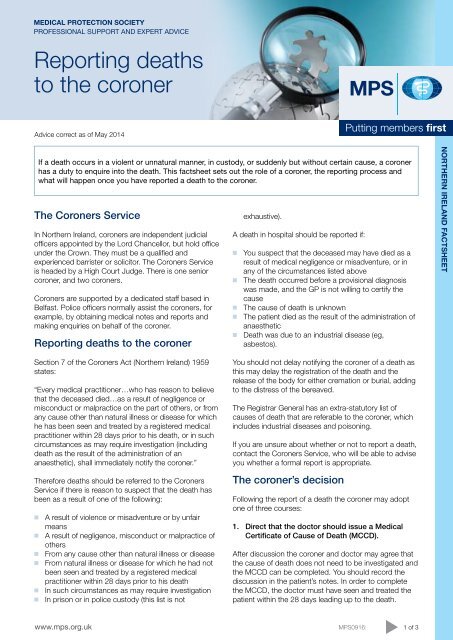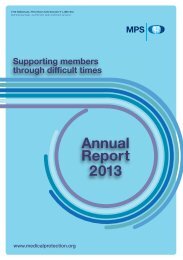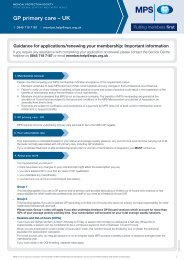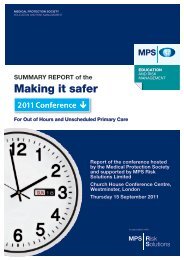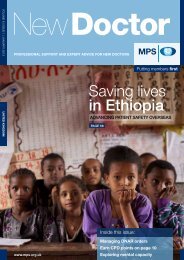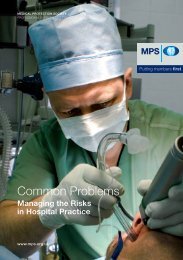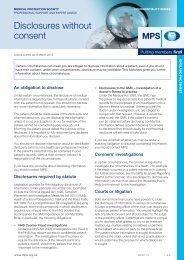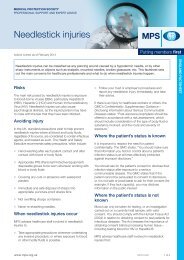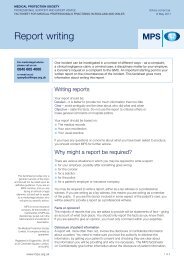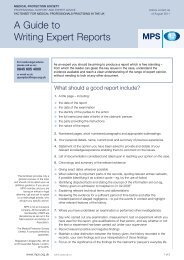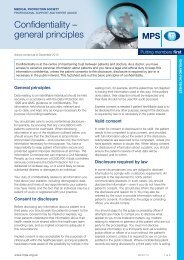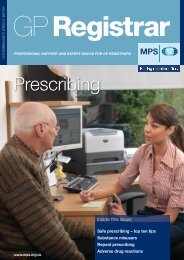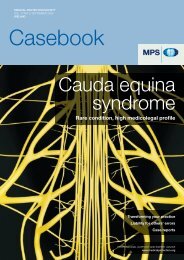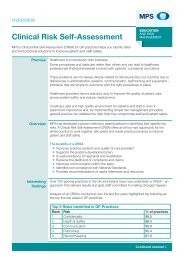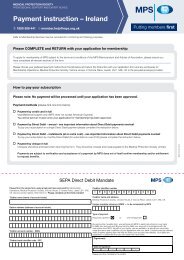Reporting deaths to the coroner - Medical Protection Society
Reporting deaths to the coroner - Medical Protection Society
Reporting deaths to the coroner - Medical Protection Society
You also want an ePaper? Increase the reach of your titles
YUMPU automatically turns print PDFs into web optimized ePapers that Google loves.
MEDICAL PROTECTION SOCIETY<br />
PROFESSIONAL SUPPORT AND EXPERT ADVICE<br />
<strong>Reporting</strong> <strong>deaths</strong><br />
<strong>to</strong> <strong>the</strong> <strong>coroner</strong><br />
Advice correct as of May 2014<br />
If a death occurs in a violent or unnatural manner, in cus<strong>to</strong>dy, or suddenly but without certain cause, a <strong>coroner</strong><br />
has a duty <strong>to</strong> enquire in<strong>to</strong> <strong>the</strong> death. This factsheet sets out <strong>the</strong> role of a <strong>coroner</strong>, <strong>the</strong> reporting process and<br />
what will happen once you have reported a death <strong>to</strong> <strong>the</strong> <strong>coroner</strong>.<br />
The Coroners Service<br />
In Nor<strong>the</strong>rn Ireland, <strong>coroner</strong>s are independent judicial<br />
officers appointed by <strong>the</strong> Lord Chancellor, but hold office<br />
under <strong>the</strong> Crown. They must be a qualified and<br />
experienced barrister or solici<strong>to</strong>r. The Coroners Service<br />
is headed by a High Court Judge. There is one senior<br />
<strong>coroner</strong>, and two <strong>coroner</strong>s.<br />
Coroners are supported by a dedicated staff based in<br />
Belfast. Police officers normally assist <strong>the</strong> <strong>coroner</strong>s, for<br />
example, by obtaining medical notes and reports and<br />
making enquiries on behalf of <strong>the</strong> <strong>coroner</strong>.<br />
<strong>Reporting</strong> <strong>deaths</strong> <strong>to</strong> <strong>the</strong> <strong>coroner</strong><br />
exhaustive).<br />
A death in hospital should be reported if:<br />
■■<br />
■■<br />
■■<br />
■■<br />
■■<br />
You suspect that <strong>the</strong> deceased may have died as a<br />
result of medical negligence or misadventure, or in<br />
any of <strong>the</strong> circumstances listed above<br />
The death occurred before a provisional diagnosis<br />
was made, and <strong>the</strong> GP is not willing <strong>to</strong> certify <strong>the</strong><br />
cause<br />
The cause of death is unknown<br />
The patient died as <strong>the</strong> result of <strong>the</strong> administration of<br />
anaes<strong>the</strong>tic<br />
Death was due <strong>to</strong> an industrial disease (eg,<br />
asbes<strong>to</strong>s).<br />
WALES NORTHERN FACTSHEET IRELAND FACTSHEET<br />
Section 7 of <strong>the</strong> Coroners Act (Nor<strong>the</strong>rn Ireland) 1959<br />
states:<br />
“Every medical practitioner…who has reason <strong>to</strong> believe<br />
that <strong>the</strong> deceased died…as a result of negligence or<br />
misconduct or malpractice on <strong>the</strong> part of o<strong>the</strong>rs, or from<br />
any cause o<strong>the</strong>r than natural illness or disease for which<br />
he has been seen and treated by a registered medical<br />
practitioner within 28 days prior <strong>to</strong> his death, or in such<br />
circumstances as may require investigation (including<br />
death as <strong>the</strong> result of <strong>the</strong> administration of an<br />
anaes<strong>the</strong>tic), shall immediately notify <strong>the</strong> <strong>coroner</strong>.”<br />
Therefore <strong>deaths</strong> should be referred <strong>to</strong> <strong>the</strong> Coroners<br />
Service if <strong>the</strong>re is reason <strong>to</strong> suspect that <strong>the</strong> death has<br />
been as a result of one of <strong>the</strong> following:<br />
■■<br />
■■<br />
■■<br />
■■<br />
■■<br />
■■<br />
A result of violence or misadventure or by unfair<br />
means<br />
A result of negligence, misconduct or malpractice of<br />
o<strong>the</strong>rs<br />
From any cause o<strong>the</strong>r than natural illness or disease<br />
From natural illness or disease for which he had not<br />
been seen and treated by a registered medical<br />
practitioner within 28 days prior <strong>to</strong> his death<br />
In such circumstances as may require investigation<br />
In prison or in police cus<strong>to</strong>dy (this list is not<br />
You should not delay notifying <strong>the</strong> <strong>coroner</strong> of a death as<br />
this may delay <strong>the</strong> registration of <strong>the</strong> death and <strong>the</strong><br />
release of <strong>the</strong> body for ei<strong>the</strong>r cremation or burial, adding<br />
<strong>to</strong> <strong>the</strong> distress of <strong>the</strong> bereaved.<br />
The Registrar General has an extra-statu<strong>to</strong>ry list of<br />
causes of death that are referable <strong>to</strong> <strong>the</strong> <strong>coroner</strong>, which<br />
includes industrial diseases and poisoning.<br />
If you are unsure about whe<strong>the</strong>r or not <strong>to</strong> report a death,<br />
contact <strong>the</strong> Coroners Service, who will be able <strong>to</strong> advise<br />
you whe<strong>the</strong>r a formal report is appropriate.<br />
The <strong>coroner</strong>’s decision<br />
Following <strong>the</strong> report of a death <strong>the</strong> <strong>coroner</strong> may adopt<br />
one of three courses:<br />
1. Direct that <strong>the</strong> doc<strong>to</strong>r should issue a <strong>Medical</strong><br />
Certificate of Cause of Death (MCCD).<br />
After discussion <strong>the</strong> <strong>coroner</strong> and doc<strong>to</strong>r may agree that<br />
<strong>the</strong> cause of death does not need <strong>to</strong> be investigated and<br />
<strong>the</strong> MCCD can be completed. You should record <strong>the</strong><br />
discussion in <strong>the</strong> patient’s notes. In order <strong>to</strong> complete<br />
<strong>the</strong> MCCD, <strong>the</strong> doc<strong>to</strong>r must have seen and treated <strong>the</strong><br />
patient within <strong>the</strong> 28 days leading up <strong>to</strong> <strong>the</strong> death.<br />
www.mps.org.uk<br />
MPS0916:<br />
1 of 3
2. Allow <strong>the</strong> death <strong>to</strong> be processed under <strong>the</strong><br />
“pro-forma” system.<br />
The Coroners’ Pro-forma is a special form for stating <strong>the</strong><br />
cause of death and providing brief particulars of <strong>the</strong><br />
background circumstances. Normally, <strong>the</strong> <strong>coroner</strong> will<br />
agree <strong>to</strong> use <strong>the</strong> “pro-forma” system where:<br />
■■<br />
■■<br />
■■<br />
It is a natural death and <strong>the</strong> only reason a death<br />
certificate cannot be issued is that <strong>the</strong> doc<strong>to</strong>r has not<br />
seen and treated <strong>the</strong> deceased for <strong>the</strong> condition from<br />
which <strong>the</strong>y died within 28 days of death<br />
The cause of death is not a natural one but <strong>the</strong>re are<br />
no suspicious circumstances<br />
The cause of death is not a natural one but a postmortem<br />
examination is unnecessary as a definite<br />
diagnosis had already been made.<br />
A doc<strong>to</strong>r should not proceed <strong>to</strong> use <strong>the</strong> “pro-forma”<br />
system for a death without having first agreed that<br />
course with <strong>the</strong> <strong>coroner</strong>.<br />
following <strong>the</strong> guidance in Confidentiality.”<br />
In relation <strong>to</strong> hospital <strong>deaths</strong>, <strong>the</strong> police officer will<br />
normally require a member of staff <strong>to</strong> formally identify <strong>the</strong><br />
body.<br />
If <strong>the</strong> <strong>coroner</strong> directs a postmortem examination, <strong>the</strong><br />
doc<strong>to</strong>r who reported <strong>the</strong> death should prepare a clinical<br />
summary for <strong>the</strong> pathologist.<br />
Stillbirths<br />
A judgment handed down by <strong>the</strong> Court of Appeal in<br />
Nor<strong>the</strong>rn Ireland concluded that in relation <strong>to</strong> <strong>the</strong><br />
Coroners Act 1959, <strong>the</strong> definition of a deceased person<br />
includes “a foetus in utero <strong>the</strong>n capable of being born<br />
alive:”. When dealing with cases of stillbirth, practitioners<br />
should consider <strong>the</strong>ir obligations <strong>to</strong> notify <strong>the</strong> <strong>coroner</strong> in<br />
accordance with Section 7 of <strong>the</strong> Act.<br />
Registration of a death<br />
NORTHERN IRELAND FACTSHEET<br />
The pro-forma should be sent immediately by fax and<br />
followed by hard copy <strong>to</strong> <strong>the</strong> Coroners Service. It should<br />
not be given <strong>to</strong> <strong>the</strong> family as <strong>the</strong>y may confuse it with an<br />
MCCD and try <strong>to</strong> take it <strong>to</strong> <strong>the</strong> Registrar.<br />
If <strong>the</strong> death was due <strong>to</strong> natural causes which a doc<strong>to</strong>r<br />
is able <strong>to</strong> confirm, <strong>the</strong> <strong>coroner</strong> will advise <strong>the</strong> Registrar<br />
by issuing a Coroner’s Notification and <strong>the</strong> death can be<br />
registered.<br />
3. Direct a postmortem examination.<br />
A <strong>coroner</strong> will usually request a postmortem examination<br />
if <strong>the</strong>re is uncertainty over <strong>the</strong> cause of death, or <strong>the</strong><br />
death was sudden and <strong>the</strong> cause unknown.<br />
If a postmortem is ordered <strong>the</strong>n <strong>the</strong> death cannot be<br />
registered until <strong>the</strong> <strong>coroner</strong>’s investigation has been<br />
completed. However, <strong>the</strong> <strong>coroner</strong>’s liaison officer will<br />
provide <strong>the</strong> family with a “Cornoner’s Certificate of<br />
Evidence of Death” which can be helpful in <strong>the</strong><br />
administration of <strong>the</strong> Estate.<br />
Once <strong>the</strong> investigation is complete, <strong>the</strong> <strong>coroner</strong> will<br />
decide whe<strong>the</strong>r <strong>to</strong> hold an inquest or, if this is not<br />
necessary, <strong>the</strong> <strong>coroner</strong> will issue a Coroner’s Notification<br />
<strong>to</strong> <strong>the</strong> Registrar of Deaths.<br />
If an inquest is <strong>to</strong> be held, witnesses may be called <strong>to</strong><br />
give evidence in person or required <strong>to</strong> submit written<br />
evidence <strong>to</strong> be presented at <strong>the</strong> inquest.<br />
The GMC’s Good <strong>Medical</strong> Practice states: “You must<br />
co-operate with formal inquiries and complaints<br />
procedures and must offer all relevant information while<br />
Before a death can be registered, <strong>the</strong>re must be ei<strong>the</strong>r a<br />
properly issued MCCD issued by a registered medical<br />
practitioner (<strong>the</strong> death certificate is issued by <strong>the</strong><br />
Registrar of Births and Deaths) or a certificate from a<br />
<strong>coroner</strong> issued after appropriate investigations.<br />
If you are <strong>the</strong> attending medical practitioner in a patient’s<br />
last illness, you are required by law <strong>to</strong> sign a certificate<br />
stating <strong>the</strong> cause of death <strong>to</strong> <strong>the</strong> best of your knowledge<br />
and belief. This must be submitted by <strong>the</strong> informant <strong>to</strong><br />
<strong>the</strong> Registrar of Births and Deaths. However, if <strong>the</strong> death<br />
has been or will be referred <strong>to</strong> <strong>the</strong> <strong>coroner</strong>, you should<br />
not complete <strong>the</strong> MCCD until <strong>the</strong> matter has been<br />
discussed with <strong>the</strong> <strong>coroner</strong>. The certificate is a legal<br />
statement and medical practitioners are obliged <strong>to</strong> take<br />
reasonable steps <strong>to</strong> check <strong>the</strong> information. Relevant<br />
information must not be deliberately left out.<br />
O<strong>the</strong>r functions of <strong>the</strong> <strong>coroner</strong>s<br />
A <strong>coroner</strong> must also be notified in every case when a<br />
body is <strong>to</strong> be taken out of Nor<strong>the</strong>rn Ireland. Coroners<br />
also currently have responsibility for investigating when<br />
treasure is found in <strong>the</strong>ir district.<br />
For medicolegal advice please call us on:<br />
0845 605 4000<br />
or email us at: querydoc@mps.org.uk<br />
This factsheet provides only a general overview of <strong>the</strong> <strong>to</strong>pic and should not be relied upon as definitive<br />
guidance. If you are an MPS member, and you are facing an ethical or legal dilemma, call and ask <strong>to</strong> speak<br />
<strong>to</strong> a medicolegal adviser, who will give you specific advice.<br />
MPS is not an insurance company. All <strong>the</strong> benefits of membership of MPS are discretionary as set out in <strong>the</strong><br />
Memorandum and Articles of Association. The <strong>Medical</strong> <strong>Protection</strong> <strong>Society</strong> Limited. A company limited by<br />
guarantee. Registered in England No. 36142 at 33 Cavendish Square, London, W1G OPS.<br />
www.mps.org.uk<br />
Image © Günay Mutlu / iS<strong>to</strong>ckpho<strong>to</strong>.com<br />
MPS0916:<br />
2 of 3
Fur<strong>the</strong>r information<br />
■■<br />
Coroners Service for Nor<strong>the</strong>rn Ireland –<br />
www.<strong>coroner</strong>sni.gov.uk<br />
■■<br />
■■<br />
■■<br />
General Register Office – www.groni.gov.uk<br />
Death Certification and Investigation in England,<br />
Wales and Nor<strong>the</strong>rn Ireland – Report of a<br />
fundamental review –<br />
www.archive2.official-documents.co.uk<br />
Modernising <strong>the</strong> Coroners Service in Nor<strong>the</strong>rn Ireland<br />
– The Way Forward – www.<strong>coroner</strong>sni.gov.uk<br />
NORTHERN IRELAND FACTSHEET<br />
■■<br />
Coroners Act (Nor<strong>the</strong>rn Ireland) 1959 – www.<br />
legislation.gov.uk/apni/1959/15<br />
■■<br />
GMC, Good <strong>Medical</strong> Practice (2013) paragraph 73<br />
– www.gmc-uk.org<br />
■■<br />
Department of Health, Social Services and Public<br />
Safety, Guidance on <strong>deaths</strong>, stillbirth and cremation<br />
certification – www.dhsspsni.gov.uk<br />
For medicolegal advice please call us on:<br />
0845 605 4000<br />
or email us at: querydoc@mps.org.uk<br />
This factsheet provides only a general overview of <strong>the</strong> <strong>to</strong>pic and should not be relied upon as definitive<br />
guidance. If you are an MPS member, and you are facing an ethical or legal dilemma, call and ask <strong>to</strong> speak<br />
<strong>to</strong> a medicolegal adviser, who will give you specific advice.<br />
MPS is not an insurance company. All <strong>the</strong> benefits of membership of MPS are discretionary as set out in <strong>the</strong><br />
Memorandum and Articles of Association. The <strong>Medical</strong> <strong>Protection</strong> <strong>Society</strong> Limited. A company limited by<br />
guarantee. Registered in England No. 36142 at 33 Cavendish Square, London, W1G OPS.<br />
www.mps.org.uk<br />
Image © Günay Mutlu / iS<strong>to</strong>ckpho<strong>to</strong>.com<br />
MPS0916:<br />
3 of 3


